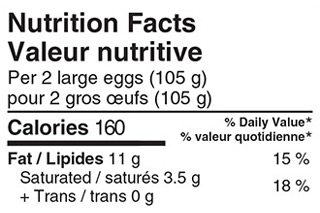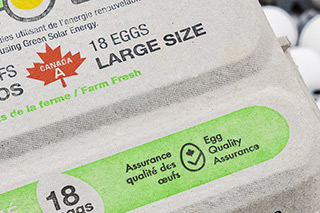Frequently Asked Questions
Egg Nutrition
What's in the Feed?
Laying hens are fed a nutritious diet of grains such as corn, soybeans, and canola and supplemented with animal source protein and fat to meet the nutrient requirements. Pork meat meal is a readily available feed ingredient that provides laying hens with high-quality protein/amino acids and energy, and contributes calcium and phosphorus for shell quality and bone strength. Specialty eggs like vegetarian brands are produced from hens fed a diet containing only ingredients of plant origin.
Are brown eggs more nutritious than white eggs?
Brown and white eggs have the same nutritional value. Shell colour depends on the strain of hen that lays the egg. Usually white-feathered hens lay white eggs and brown-feathered hens lay brown eggs.
Which part of the egg is more nutritious - the yolk or the white?
The yolk has many essential nutrients including phosphorous, iron, zinc, vitamins A, B6 and B12, folic acid, pantothenic acid, choline, and thiamin, as well as almost half of the protein and riboflavin in the whole egg. In addition, egg yolks are among the few foods that naturally contain vitamin D. Both the yolk and white have different nutritional profiles. The majority of nutrients are found in the yolk. Finally, the yolk contains 190 mg of cholesterol and 5 g of fat, less than a third of which is saturated fat, and no trans fat.

 Affordable Meals
Affordable Meals New Recipes
New Recipes Powered by Eggs
Powered by Eggs Ho Ho Holidays!
Ho Ho Holidays! Recipe Booklets
Recipe Booklets Egg Nutrition
Egg Nutrition Care & Quality
Care & Quality Types of Eggs
Types of Eggs